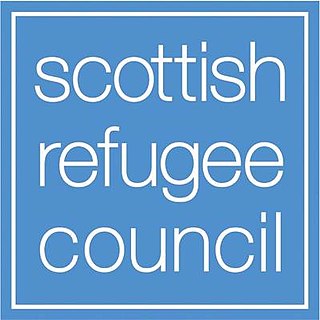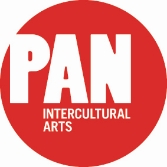An asylum seeker is a person who leaves their country of residence, enters another country and applies for asylum in that other country. An asylum seeker is an immigrant who is making a claim to have been forcibly displaced and might have fled their home country because of war or other factors harming them or their family. If their case is accepted, they become considered a refugee. The terms asylum seeker, refugee and illegal immigrant are often confused.

The Scottish Refugee Council is a registered charity that provides advice and services to asylum seekers and refugees. The objective of the organisation is ‘building a better future with refugees in Scotland’.

The Pacific Solution is the name given to the government of Australia's policy of transporting asylum seekers to detention centres on island nations in the Pacific Ocean, rather than allowing them to land on the Australian mainland. Initially implemented from 2001 to 2007, it had bipartisan support from the Coalition and Labor opposition at the time. The Pacific Solution consisted of three central strategies:

The Dublin Regulation is a Regulation of the European Union that determines which EU member state is responsible for the examination of an application for asylum, submitted by persons seeking international protection under the Geneva Convention and the Qualification Directive, within the European Union.
The right of asylum, sometimes called right of political asylum, is an ancient juridical concept, under which people persecuted by their own rulers might be protected by another sovereign authority, such as a second country or another entity which in medieval times could offer sanctuary. This right was recognized by the Ancient Egyptians, the Greeks, and the Hebrews, from whom it was adopted into Western tradition. René Descartes fled to the Netherlands, Voltaire to England, and Thomas Hobbes to France, because each state offered protection to persecuted foreigners.
Anne Mary Phelan was an Australian actress of stage and screen who appeared in many theatre, television and film productions as well as radio and voice-over.
Non-refoulement is a fundamental principle of international law that forbids a country receiving asylum seekers from returning them to a country in which they would be in probable danger of persecution based on "race, religion, nationality, membership of a particular social group or political opinion". Unlike political asylum, which applies to those who can prove a well-grounded fear of political persecution, non-refoulement refers to the generic repatriation of people, including refugees into war zones and other disaster locales.
CCJO René Cassin – more commonly known as René Cassin – is a charitable human rights NGO that works to promote and protect universal human rights, drawing on Jewish experiences and values. The organisation does this by campaigning for change in defined human rights areas through a combination of advocacy, policy analysis, public campaigning and education and building the capacity of activists and lawyers to promote and protect human rights. The organisation works in human rights areas that bear some relation to Jewish experience, such as discrimination, asylum, and genocide. The organisation holds special consultative status with the United Nations as a constituent organisation of the Consultative Council of Jewish Organisation (CCJO). The CCJO's first President was René Cassin, a principal drafter of the UN Declaration of Human Rights, who was awarded the Nobel Peace Prize in 1968 in recognition of his work for human rights as a jurist, academic and statesman. The CCJO has been an active supporter of efforts to increase the effectiveness of the UN's human rights treaties and institutional mechanisms in the intervening decades. From the 1940s to the 1970s it was involved in the creation of the United Nations human rights instruments, which form the basis of the UN's human rights activities today.
World Refugee Day is an international day organised every year on 20 June by the United Nations. It is designed to celebrate and honour refugees from around the world. The day was first established on 20 June 2001, in recognition of the 50th anniversary of the 1951 Convention Relating to the Status of Refugees.
The Glasgow Girls is a group of seven young women in Glasgow, Scotland, who highlighted the poor treatment of asylum seekers whose rights of appeal had been exhausted. In 2005, the group campaigned against dawn raids, raised public awareness, and found support in the Scottish Parliament. Their story has been told in a musical and 2 documentaries.
George Newhouse is an Australian human rights lawyer and a former local councillor. He is the principal solicitor of the National Justice Project, a human rights and social justice legal service, and currently an Adjunct Professor of Law at Macquarie University. and at the University of Technology Sydney.

The Australian government has a policy and practice of detaining in immigration detention facilities non-citizens not holding a valid visa, suspected of visa violations, illegal entry or unauthorised arrival, and those subject to deportation and removal in immigration detention until a decision is made by the immigration authorities to grant a visa and release them into the community, or to repatriate them to their country of origin/passport. Persons in immigration detention may at any time opt to voluntarily leave Australia for their country of origin, or they may be deported or given a bridging or temporary visa. In 1992, Australia adopted a mandatory detention policy obliging the government to detain all persons entering or being in the country without a valid visa, while their claim to remain in Australia is processed and security and health checks undertaken. Also, at the same time, the law was changed to permit indefinite detention, from the previous limit of 273 days. The policy was instituted by the Keating government in 1992, and was varied by the subsequent Howard, Rudd, Gillard, Abbott, Turnbull, Morrison and Albanese Governments. The policy is regarded as controversial and has been criticised by a number of organisations. In 2004, the High Court of Australia confirmed the constitutionality of indefinite mandatory detention of non-citizens. However, this interpretation was overturned in a landmark decision, NZYQ v Minister for Immigration, in 2023, with the High Court concluding the practice was unlawful and unconstitutional.
The United Nations High Commissioner for Refugees Representation in Cyprus is an office of the United Nations High Commissioner for Refugees (UNHCR) opened in August 1974 upon the request of the Government of Cyprus and the Secretary-General of the United Nations. UNHCR Representation in Cyprus was designated as Coordinator of the United Nations Humanitarian Assistance for Cyprus. UNHCR was also responsible upon the request of the Cyprus Government to examine applications for refugee status.
iceandfire is a London-based charity. Its stated mission is to explore human rights stories through theatrical performance. It also runs Actors for Human Rights, a network of volunteer actors across the UK.

RAPAR is a human rights organisation based in Manchester, UK, which is primarily concerned with displaced people, and issues relating to displaced people.
The International Detention Coalition (IDC) is an incorporated not-for-profit organization, forming a network of more than 400 non-governmental organizations, faith-based groups, academics and individuals that provide legal, social, medical and other services, carry out research and reporting, and undertake advocacy and policy work on behalf of refugees, asylum seekers and migrants. These groups and individuals from more than 50 countries, have come together to form the IDC to share information and promote good practices and the greater use of international and regional human rights standards and principles as they relate to the detention of refugees, asylum seekers and migrants. This includes advocating for greater respect for the human rights of detainees, preventing and limiting the use of, seeking alternatives to, and using the least restrictive forms of, immigration detention.
The Asylum Seeker Resource Centre (ASRC) is an asylum seeker support organisation in Australia. The ASRC, based in Footscray, a suburb of Melbourne, Victoria, provides aid, justice and empowerment programs to over 1000 asylum seekers living in the community seeking refugee protection. The ASRC is run by a team of over 1000 volunteers and around 100 paid staff, and is headed by former university lecturer and lawyer Kon Karapanagiotidis.
Asylum in Australia has been granted to many refugees since 1945, when half a million Europeans displaced by World War II were given asylum. Since then, there have been periodic waves of asylum seekers from South East Asia and the Middle East, with government policy and public opinion changing over the years.
LGBT migration is the movement of lesbian, gay, bisexual and transgender (LGBT) people around the world or within one country. LGBT individuals choose to migrate so as to escape discrimination, bad treatment and negative attitudes due to their sexuality, including homophobia and transphobia. These people are inclined to be marginalized and face socio-economic challenges in their home countries. Globally and domestically, many LGBT people attempt to leave discriminatory regions in search of more tolerant ones.

Pan is an intercultural arts organization and registered charity based in London, UK, that uses the arts to explore cultural diversity and social change. The main purpose of the organization is to help marginalised young people from all cultures and religions who are at risk of social exclusion to improve personal and interpersonal skills through a range of arts activities including drama, music, film, dance, creative writing and visual arts.





